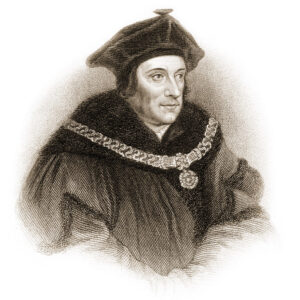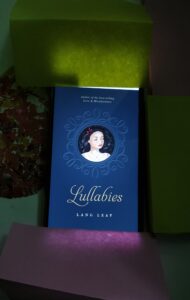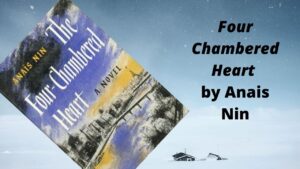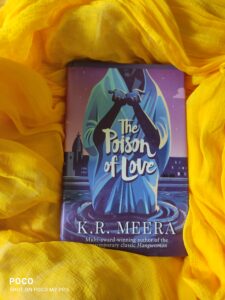
Utopia by Sir Thomas More, (1478–1535)
Type of Work: Humanistic treatise
Author: Sir Thomas More (1478-1535)
Time: Reign of Henry VII of England
Locale: Antwerp, England, Utopia
First published: 1516
Principal characters:
Thomas More: He is the author of this book. He is a writer, lawyer, philosopher, politician, and catholic saint.
Peter Giles: He is a citizen of Antwerp and a friend of Thomas More.
Raphael Hythloday: He is a traveller and acquaintance of Peter Giles. He is the imagination of More and also the second self whom More created for his own safety. He can easily voice those ideas which are otherwise prohibited at that time.
Cardinal Morton: Churchman and Chancellor of Henry -Vll
A Lawyer: He is the man who opposed Hythloday’s opinions in Book 1.
Sir Thomas More (1478–1535)
The records for Sir Thomas More’s birth are not exact, although historians deduce he was born on February 7, 1478, in London, England.
More was the son of John More and Agnes Graunger More.
More became a page in the household of Archbishop Morton at age 13 and went to Oxford the following year.
He received a B.A. in 1494 and studied law. Between 1503-1504 he exercised the piety of the monk’s spiritual life and decided to be a monk.
But in 1504 he stood in the election in parliament though he followed austerity throughout his life.

In 1529 he was appointed as lord chancellor of England, the most powerful position in the kingdom below the king himself.
In his adult life, More served Henry VIII and Parliament, and in 1521 he was knighted. When Henry declared himself head of the Church of England in 1531, however, More was forced to choose between his king and his Church. Even he did not attend the coronation of Anne Boleyn, Henry-VIII’s second wife. Faithful to the Church until his last days, More resigned his chancellor position and three years later refused to swear an oath endorsing the authority of Henry VIII over the Church of England and nullifying that of the pope in England. More was sent to the Tower of London and was beheaded on July 6, 1535. In 1935 the Catholic Church acknowledged his loyalty by making him a saint.
More was perhaps the single most important intellectual in early-16th-century England and was a key figure to introduce humanism in England.
Literary Works:
As early as 1505, when it is believed he considered entering the priesthood, he was translating The Life of Pico (1509), about the famous 15th-century Italian humanist. Also a historian, More wrote The History of Richard III between 1514 and 1518, in which he innovatively forges a symbolic connection between Richard’s physical and moral deformity. This history helped establish the myth that Richard III was an evil, physically deformed dictator who murdered his brothers and nephews to become king of England.
Utopia:
More’s most famous work was his philosophical romance Utopia (1516), in which a mariner tells a story about an ideal state.
The novel was written in Latin from 1515-1516. Later it was translated into English by Ralph Robinson, in 1551. The name utopia is of Greek Origin. It means ‘No Place’.
Sources: It is based on Plato’s Concept of an ideal state in the Republic. St. Augustine’s De civitate Dei, Vespucci’s accounts of New World voyages, and Erasmus’ Institutio principis Christiani are some of the other sources.
Utopia, which means “nowhere” and is the name More gave to his fictional island, reads like a call for social reform. “When I run over in my mind,” says Raphael Hythlodaeus, the character who describes Utopia, “the various commonwealths flourishing today, so help me God, I can see nothing in them but a conspiracy of the rich, who are fatten-ing up their interests under the name and title of the commonwealth,” a word that simultaneously suggests a state and the commonwealth in the 16th century. Somewhat it echoed the ideology of Karl Marx, propagator of communism.
Book-1
Book 1 is set during the rule of Henry-VII. More is introduced by his friend Peter Giles to an alleged companion of Amerigo Vespucci, Raphael Hythloday who condemns the conditions he found in England under Henry Vll: excessive punishment for theft, unjust taxation, unequal distribution of wealth and property, enclosures, the advance of the rich and the desperation of the poor, a vivid picture of the bleak dark social scenario of England – ravaged through war, lawlessness, peasants dissatisfaction and misery and exploitation as well as corruption of church and state,
The story begins when Thomas More travels to Antwerp on a royal mission. There he met Peter Giles, a worthy citizen of Antwerp. Peter Gilles introduced him to Raphael Hythloday ( Greek meaning “a talker of nonsense”). This fictional character Hythloday was a companion of Amerigo Vespucci on their Journey to America. During one of those journeys, they discovered the fabled land of Utopia, somewhere in the oceans near the Western hemisphere.
Ist part of utopia – does not deal with the legendary island – But Raphael describes the despondency and corruption during the reign of King Henry – VII. He was in conversion with Cardinal Morton Churchman and Chancellor of Henry –Vll when he suggested some reforms which might benefit England :
-
Abolishment of the death penalty for theft
-
Prevention of gambling
-
Less dependence upon sheep for wool
-
Disuse of mercenary soldiers
-
Cheaper prices for all commodities
-
End of to the enclosure of the common lands for the benefit of a great and wealthy landlord.






